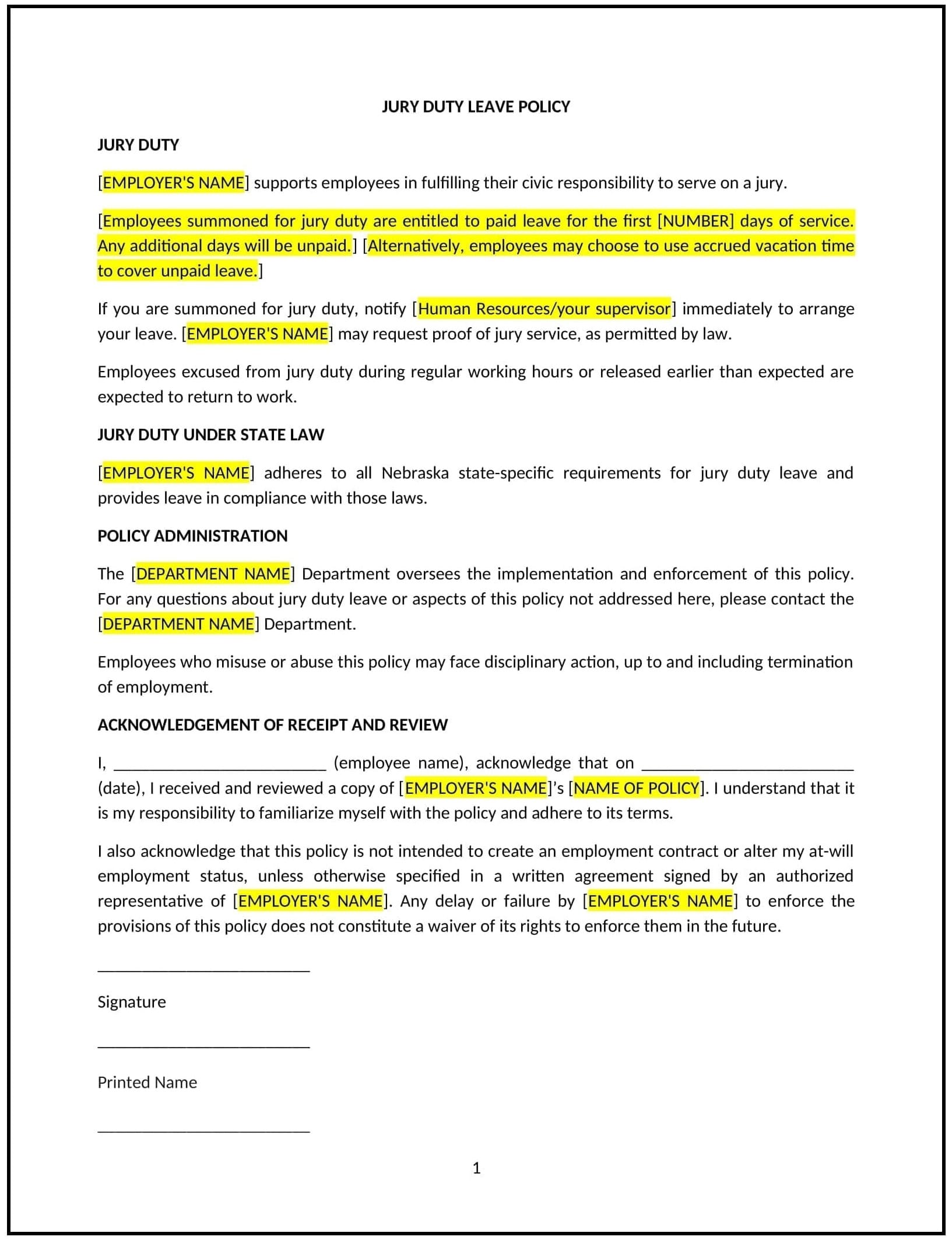Got contracts to review? While you're here for policies, let Cobrief make contract review effortless—start your free review now.

Customize this template for free
Jury duty leave policy (Nebraska)
A jury duty leave policy helps Nebraska businesses provide employees with time off to fulfill their civic duties while minimizing disruptions to the workplace. This policy outlines how employees can request leave for jury duty, the process for verification, and whether the leave is paid or unpaid. It is designed to balance employees' obligations to participate in the judicial system with the needs of the business, promoting fairness and respect for legal responsibilities.
By adopting this policy, businesses in Nebraska can ensure that employees can participate in jury duty without fear of negative consequences, while maintaining operational continuity.
How to use this jury duty leave policy (Nebraska)
- Define eligibility for jury duty leave: Specify which employees are eligible for jury duty leave, typically covering full-time employees. Clarify whether the policy applies to employees summoned for jury duty in any court, including state and federal courts, and outline any eligibility requirements.
- Set guidelines for requesting leave: Employees should be instructed on how to request jury duty leave, including providing a copy of the jury summons and notifying their supervisor within a reasonable time frame. Include the procedure for submitting documentation, such as a court-issued summons.
- Clarify paid versus unpaid leave: Clearly state whether jury duty leave is paid or unpaid. If the company offers paid leave, specify the pay rate (e.g., the employee’s regular wage or a flat daily amount). If the leave is unpaid, indicate that employees can use paid time off (PTO) or vacation time if desired.
- Outline the length of leave: The policy should address how long employees are entitled to take leave for jury duty, typically including the length of time required for jury selection and trial participation. Indicate that employees must return to work as soon as their jury duty obligations have ended.
- Address job protection: Ensure employees are aware that their job will be protected while they are on jury duty, and that they will not face retaliation for fulfilling their civic duty. Clarify that employees should return to their original job or an equivalent position once they return from jury duty.
- Provide documentation requirements: Specify the type of documentation employees need to provide to verify their jury duty service, such as a certificate of service or an official statement from the court. Explain the deadline for submitting this documentation.
- Handle conflicts or emergencies: Address how employees should handle any conflicts or emergencies that arise due to extended jury duty service. Include provisions for employees to communicate with their supervisors about any changes in the expected duration of their leave.
- Review and update: Periodically review and update the policy to reflect changes in Nebraska state law or federal regulations regarding jury duty leave. Ensure that the policy remains consistent with legal requirements and best practices.
Benefits of using this jury duty leave policy (Nebraska)
This policy provides several benefits for Nebraska businesses:
- Promotes fairness and civic responsibility: Providing employees with the opportunity to serve on a jury without financial or job-related consequences supports the importance of civic engagement and fairness in the legal system.
- Reduces legal risks: A clear and fair jury duty leave policy helps businesses avoid potential legal issues related to discrimination, retaliation, or failure to comply with state or federal jury duty leave requirements.
- Improves employee satisfaction: Offering jury duty leave demonstrates the company’s commitment to supporting employees in fulfilling their civic duties, which can enhance employee morale and loyalty.
- Supports transparency and consistency: A clearly defined policy ensures that all employees are treated fairly and consistently when requesting jury duty leave, reducing confusion or misunderstandings.
- Minimizes operational disruption: By encouraging early communication and planning, the policy helps businesses manage operations effectively when employees need to take time off for jury duty.
Tips for using this jury duty leave policy (Nebraska)
- Communicate the policy clearly: Ensure that all employees are aware of the jury duty leave policy and understand the process for requesting leave. Include the policy in employee handbooks and employee orientation materials.
- Encourage timely notice: Encourage employees to inform their supervisors as soon as they are summoned for jury duty to ensure adequate planning for their absence. Supervisors should be flexible with employees during this process and plan for workload distribution.
- Keep records of jury duty leave: Maintain records of all jury duty leave requests, including dates of service and any documentation provided by employees. This helps ensure accurate tracking and compliance.
- Consider providing paid jury duty leave: If possible, consider offering paid jury duty leave to employees as an added benefit. This can promote goodwill and support employees in fulfilling their civic responsibilities.
- Be mindful of confidentiality: Ensure that any personal information about employees’ jury duty service is kept confidential and not shared unnecessarily.